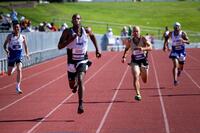High school students who are preparing for fitness assessments for service academies, ROTC programs or military boot camp can face an easy process or a competitive one, depending on the program.
Many of the college programs and special-ops selection assessments require higher-than-average scores for acceptance and may require significantly more time to prepare for that challenge.
Here is an email from a high school athlete seeking admission into West Point. He has to take a candidate fitness assessment to get into this competitive commissioning program, but there is more:
Hello, Mr. Smith.
I am a candidate for West Point; I was wondering if you had any advice for me in preparing for my candidate fitness assessment (CFA). One of my mentors pointed me in your direction and said that you were the one to ask. Any help would greatly be appreciated. Respectfully, Andrew
Dear Andrew,
If you have a few months to prepare for the CFA, I would get on a program and take a sample test first to see where your weaknesses are. Remember, this test consists of several events, and you may not be used to doing some of them.
The candidate fitness assessment includes the basketball toss, shuttle run 120 feet (4x 30 feet), pull-ups (max), push-ups (two minutes), sit-ups (two minutes) and a one-mile run.
This test is designed to measure your athletic potential and compare your current aerobic and anaerobic conditioning to the more than 11,000 other applicants who are competing for one of only 1,200 slots each year.
Your focus with these exercises should be either to maintain your abilities or to improve any weaknesses. If you are in a sport, you will have to work around the busy life of being a student-athlete and add in these specific exercises to your day.
Here are the steps I would consider in this process:
1. Find your weakness. Your training will depend on how to improve in that exercise. This can be hampered by current workouts for sports.
For instance, if you are trying to get better in the mile run but you are in the middle of a heavy lifting cycle for your sports, you may have a difficult time lifting heavy legs and running faster.
Work on your goal pace and build your endurance in running while laying off the super heavy lifts. It is fine to go lighter with more reps, but if you are trying to improve your one-rep max and run a faster mile at the same time, it can be challenging and take longer than you may have available.
In order to find your weakness, take a practice test.
2. Supplement your workouts with CFA-specific exercises several times a week. On your upper-body days in sports training, add in pull-ups, push-ups and sit-ups. Throw a basketball a few times every day to get used to throwing from your knees. Add in some shoulder exercises as well, but finish the workout with a timed mile run. You may have to focus on intervals at your goal mile pace to build up to the speed and endurance needed to get faster at the mile.
Some upper-body supplement ideas:
3. There is more to follow. After you take the CFA, the good news is that you likely never will take that test again. However, if you are selected to attend West Point, you will be introduced to more running and rucking, as well as the new Army combat fitness test, which will include deadlift, medicine ball throw, shuttle run with sprints, carries, sled pulls, hand-release push-ups, leg tucks (hanging knee to elbows) and a two-mile timed run.
Preparing yourself for the specifics of this test will require a better mix of training, complete with strength, power, speed, agility, flexibility, mobility, grip, muscle stamina and cardio endurance. This is a tactical fitness test.
Your goal is to get to and through the military academy. To get to the training, you need to crush the CFA, and to get through the academy, you need to crush the new Army CFT, along with tough academic studies and military training.
Both of these require you to train specifically for them by adding the exercises of the test into your current programming.
Stew Smith is a former Navy SEAL and fitness author certified as a Strength and Conditioning Specialist (CSCS) with the National Strength and Conditioning Association. Visit his Fitness eBook store if you’re looking to start a workout program to create a healthy lifestyle. Send your fitness questions to stew@stewsmith.com.
Want to Learn More About Military Life?
Whether you're thinking of joining the military, looking for fitness and basic training tips, or keeping up with military life and benefits, Military.com has you covered. Subscribe to Military.com to have military news, updates and resources delivered directly to your inbox.
















